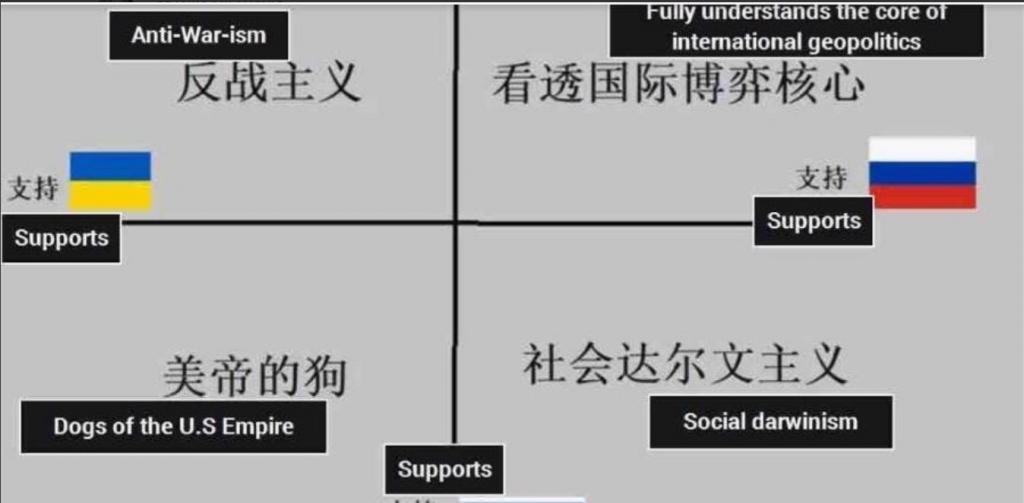2x2 Geopolitics

Branko Milanovic - Wars and ideology simplified.
Recently, a Chinese author (as seems from the text and the Chinese characters used) proposed the following understanding of international relations. (I am grateful to a friend who shared it with me yesterday.) The author noticed (as I think many have) that regarding the two wars currently being fought, very interesting (2x2) ideological coalitions have been formed. There are people who support Palestine and Ukraine, those who support Israel and Ukraine, those in favor of Russia and Palestine, and finally the group that supports Russia and Israel. What is interesting, even to a casual observer, is that neither of the four quadrants is empty, and that there is a logic in the defense of each. The Chinese author in fact even proposed the names for the four camps, which I would, in some cases, for perhaps better understanding, change.


In this post I will try to explain, I hope impartially, the logic of each camp. I will do it always from the point of view of those holding a given position.
We start with the quadrant (1,1), the defenders of the international law, or the anti-war party, as dubbed by the author. These people view both Russia and Israel as the aggressive powers that break international rules, most notably violate international borders. Russia has invaded and annexed parts of Ukraine which is a UN member, accepted in 1991 with the then-valid borders. Similarly, Israel has refused to stay within its official 1948 borders, has conquered the land which does not belong to it already in 1967, and now wants to finish the job by expelling or killing the population of Gaza. Thus, the defenders of the international law must take the position against the countries that violate it, namely they must support Ukraine and Palestine.
Defenders of the free world (or “the dogs of the US Empire”, as the author calls them using Maoist terminology) are in quadrant (2,1). They consider that the defenders of the international order are naïve. The international order is often defined by a pure numerical majority at the UN consisting of undemocratic and authoritarian governments. One has to refer to it when useful, but, given its nature, it is silly to take it as a fundamental principle to observe at all times. There are higher principles. That higher principle is “the liberal global order” or as Gideon Rachman has more appropriately called it recently in The Financial Times, the “defense of the free world”. One has to disregard international rules sometimes, as in the case of Israel today, when there is a struggle between a democracy and a terrorist organization, or between a wanna-be democracy like Ukraine and a terrorist state like Russia. It is true, the defenders of the free world would admit, that they are in favor of a unipolar world led by the US. But this is simply because the US is the strongest country that adheres to the principles of human rights and democracy. These principles, the free worlders argue, will eventually become global rules, and unipolar or hegemonic world would dissipate because everybody would be an equal member of the new global democratic polity. The support of a hegemon today is just a means leading to an equal and free world tomorrow.
Defenders of the multipolar world (quadrant 1,2), or as the author calls them “the people who fully understand the core of international politics”, believe the free-worlders are either naive or dishonest. They must be so, the defenders of multipolarity argue, because the hegemon always presents its interests as based on some general principles while in reality it seeks unchallenged dominion. European colonial powers argued that by conquering African and Asian nations they brought civilizations; Pax Romana was defended by the trade and Roman citizenship to which the defeated nations were able to accede. So the defenders of the multipolar world see the position of people in the quadrant (2,1) as a naked bid for unchallenged power. Consequently, they see Russia and Palestine as countries that try to stop that, by undermining unipolarity: Russia by showing that every strong country in a multipolar world can afford to break the rules, and Palestine by similarly refusing to accept the fact that only the United States can decide what is good for them.
Social Darwinists (quadrant 2,2) see all the above positions as hopelessly naïve. They argue that international rules are never observed by strong nations. They provide a number of historical examples to that effect. They think that the world has to accept that “might is right” and that the “strong do what they can and the weak suffer what they must”. Russia and Israel just apply this age-old truth. They attack weaker neighbors, destroy their homes, chase them away, kill them, do not recognize their existence and in doing so simply do what in history every stronger human group has done to the weaker. We have, they argue, to accept it because it is human nature and it has always been with us. It may be even good because stronger groups will, by ruling the world, make it better. Social Darwinism cannot be wished away.
It would be interesting, although difficult, to estimate what percentage of the world population would fall in each quadrant. There are of course confounding factors like religion or historical enmity that would tend to push people toward one or the other quadrant but I think that they would still need to rationalize their positions by the appeal to some more general principle.
One can try to allocate countries too, but I think that it would be misleading because countries, for many reasons, do not necessarily express the views of their populations. To give just several examples. It may be reasonable to believe that some people in Iran or Venezuela who detest their own governments may take a pro free-world position because they see the US as a benevolent hegemon that would ultimately help them get rid of their own governments. On the other hand, supporters of La France insoumise might take the multipolar position because they see France as being obliged to do policies that are decided in Washington or Brussels. Similarly, some people in Latin America may be pro-multipolar world because they dislike US hegemonic position on their continent. Russians who passionately hate Putin might easily fall into quadrant (2,1). The old-fashioned Third Worldists might re-fight the old struggles by supporting the quadrant (1,2) where Russia plays the role of the Soviet Union. Different, and at times unpredictable, combinations are possible and this is why the world is so complex.
This first appeared on Branko's blog and was reposted with permission.
Photo by Alex Green


